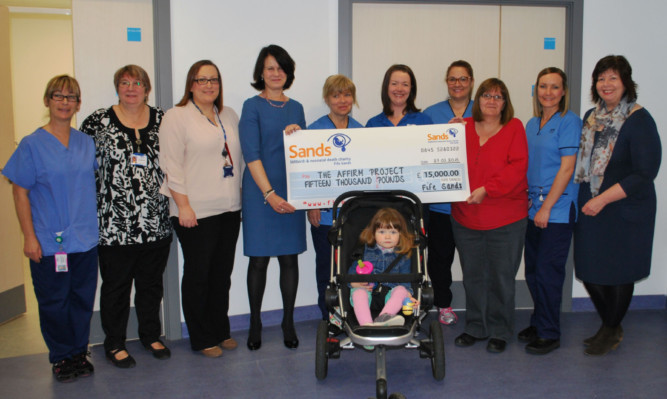Fife has been placed at the forefront of a pioneering study which could eventually help cut the number of stillbirths across the world.
The rate of stillbirths in Scotland is at a record low but is still among the highest in developed countries, with around one in 200 babies a year falling victim leaving expectant parents and relatives devastated by their loss.
But it is now hoped that a major new project will underline the importance of monitoring any changes in foetal movements in the womb to try and combat deaths in babies before they are born.
Kirkcaldy’s Victoria Hospital is one of the first Scottish hospitals taking part in the AFFIRM study, which offers health staff and pregnant women better training on foetal movements and encourages them to seek immediate attention if they notice any decline in activity.
A similar study in Norway brought about a 30% reduction in stillbirths, and hopes for an equally dramatic fall here have just been boosted by a £15,000 donation from stillbirth and neonatal death charity Fife Sands.
If the effects of early intervention are positive, then health authorities in other countries are likely to follow suit.
Robert Gassner, the local charity’s chair, said Fife Sands agreed to contribute to the research in the hope that findings will help reduce rates of stillbirth and neonatal death across Fife, Scotland and beyond.
“We are delighted to be able to donate £15,000 to the AFFIRM study,” he commented.
“Many of the families we work with tell us they want more research into stillbirth and neonatal death so that other families won’t have to experience the heartbreak of losing a child, or children.
“Of course, we are only able to provide financial assistance to AFFIRM due to the overwhelming fundraising efforts for Fife Sands.
“Our supporters provide invaluable help to bereaved parents and families and we can’t thank them enough.”
A stillborn child is defined as a baby born dead after 24 weeks gestation, with 300 babies said to be stillborn every year in Scotland.
That is 10 times as many as those who die through cot death, and places Scotland 31st out of 33 high income countries in the world for stillbirth deaths.
The AFFIRM study, led by researchers in Edinburgh and funded largely by the Scottish Government, tests to see if rates of stillbirth may be reduced by raising awareness of the need to promptly report decreased foetal movements and providing a care management plan to identify possible issues and safely deliver babies as necessary.
Any women who spot a decline in movements in the womb are offered a set course of checks and monitoring of their babies, and in some cases babies may be delivered early to help avoid stillbirth.
Similar interventions were carried out in Norway several years ago and cut the number of stillbirths by almost a third, and clinicians hope the AFFIRM study in Scotland will bring about a similarly stark drop.
“With the help of pregnant women and groups like Sands, and with funding from the Scottish Government and medical research group Tommy’s, we hope to do the same in the UK,” Professor Jane Norman, professor of maternal and foetal health at the Edinburgh Centre for Reproductive Health, told The Courier.
“Importantly, AFFIRM will test whether the intervention works, and what the consequences are for pregnant women and for the health service.
“If we can achieve even a fraction of the benefit that was achieved in Norway, it will save the lives of many babies per year.”
Professor Norman added that she was “extremely grateful” to Fife Sands for their financial contribution to the research.
The study is following a ‘stepped’ model, meaning that participating hospitals in the UK will begin introducing care packages in phases.
More hospitals are therefore expected to be involved further down the line, but Kirkcaldy’s Victoria Hospital was one of the first locations to take part.
Dr Helen Russell, consultant obstetrician and gynaecologist at NHS Fife, said: “NHS Fife are committed to reducing stillbirth rates.
“We were one of the first trusts in Scotland to take part in the AFFIRM study, and await the results with interest.”
